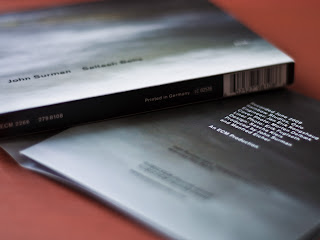I have been thinking for a while that this blog could be turned into something -slightly- more personal, and from now on I will write from time to time some posts not directly related with geology. As a geologists who works in an office, in front of two screens, mapping satellite images and doing cross-sections, I listen to a good amount of music. I enjoy very much reading (at home!) and I am also a keen photographer, so why not having some small input from this "other" Jorge?
I hope you understand this, and I would like to read your thoughts. Please, leave some comments and let me know what do you think about this decision of including some more personal posts (not much... just from time to time) in this highly specialised and technical blog.
Ground control, here I go.
Saltash Bells - John Surman

I have been listening for a few weeks to
Saltash Bells, a jazz album of
John Surman. I have never been a big fan of jazz, fundamently because of my own ignorance of this genre. But this music, together with other European jazz albums -
Garbarek,
E.S.T.,
Rypdal, etc.- are filling up to 80 or 90% of the music I have listened to during the last two months or so.
John Surman is an English saxophonist.
Saltash Bells is his latest solo work, and he plays all the instruments (soprano, tenor and baritone saxophones, alto bas and contrabass clarinets, harmonica and synthesizer) heard in the album. He has a long list of published albums, but this is the first in a long time that he publishes as soloist. Surman is one of the jewels of the German discographic
ECM. If you don't know
ECM, you are missing very good music!
This recording has an unmissible English flavour, taking inspiration from folk themes and harmonies that can easily make you imagine you travel through the West Country. In fact, the music was tought as companion for a TV series of documentaries about this part of the United Kingdom, but this project never saw light.

The music of Surman is clear, crystalline and very melodic. Background canons and cyclic phrases result in a very atmospheric soundtrack.
Whistman's Wood opens the album with a very nice musical electronic texture, which perfectly entangles different instruments blending them in a very beautiful song. It is easy with such music to feel the breeze of the the cliffs of Dorset or the water spray from the beaches of Cornwall.
Some compasses even remind me of my home music, from Asturias, in the north of Spain. I hear
The Crooked Inn and
Sailing Westward
and I can feel at home. The Atlantic connection of peoples and cultures
is very evident in this music, and I very much like this in European
music.
A common line in most of the songs is the background sound of bells, which actually give the title to the album -it's the memory as a child of the Sultash Church bells across the waters what he tries to reproduce with a synthesizer-.
This music is perfect for working. It is calm, not distracting and so atmospheric that you will listen to it serveral times before you even realise it. At least it let me work on
2DMove!
If you want to buy a very good album (and buy it as a CD, with much better quality than mp3!), just buy
Saltash Bells
.
You can hear to a sample here:
ECM Player.
Album: Saltash Bells
Artist: John Surman
Date:2012
Publisher: ECM Records GmbH (Munich). Catalogue number 2266
Track list

1 Whistman's Wood
2 Glass Flower
3 On Staddon Heights
4 Triadichorum
5 Winter Elegy
6 Ælfwin
7 Saltash Bells
8 Dark Reflections
9 The Crooked Inn
10 Sailing Westwards




